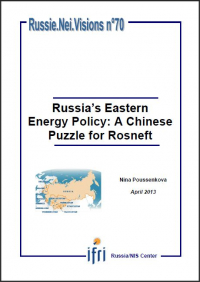Russia's Eastern Energy Policy: A Chinese Puzzle for Rosneft Russie.Nei.Visions, No. 70, April 2013
In the past decade Russia set a strategic goal: to develop the Eastern vector of its energy policy and strengthen oil and gas cooperation with the Asia-Pacific countries. While dialogue on gas with China was stalled, Rosneft, the country's number-one oil company, made a breakthrough in petroleum relations.

Rosneft received credits from Chinese banks against guaranteed supplies of oil; lobbied for the construction of a spur to China from the Eastern Siberia—Pacific Ocean pipeline system; dramatically increased oil exports to China; let CNPC and Sinopec enter the Russian upstream; cooperated with them abroad; sold some of its shares to CNPC, and consolidated its position in China's downstream. The state company is fulfilling the government's strategic plans on the diversification of markets for hydrocarbons and the development of the East of the country, while simultaneously influencing state energy policy.
Rosneft has its own long-term plans to become an international energy corporation and it is pursuing the internationalization of its business, including in the Asia-Pacific markets. Yet thanks to China, Rosneft is also supporting its short-term corporate interests: the first two loans were used to pay for the acquisition of Yukos, and now it plans to attract the Chinese money to buy TNK-BP. Therefore, the key question remains: Do its corporate interests correspond to the long-term goals of Russia, in so far as they place the country in a position of dependence on China?


